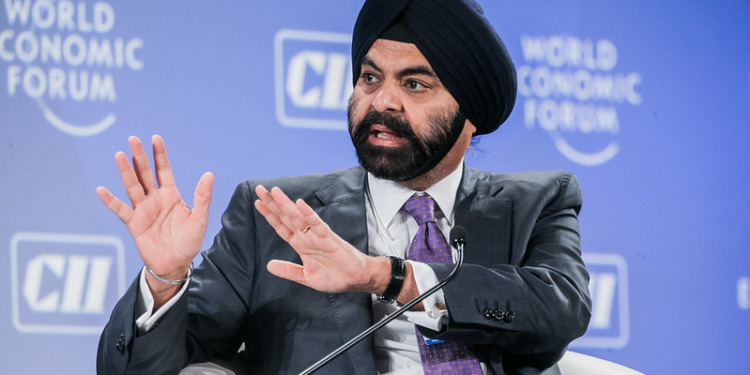A decision by the current World Bank President, David Malpass, not to seek a second term has meant that countries can now put forward candidates for the next Presidency. Historically the World Bank President has always been an American, and the U.S. Government has put forward as its nominee Ajay Banga, an American businessman.
Born in India, Ajay Banga, among other successful activities, has led Mastercard for a decade – turning the global credit company into a “green” giant with an agenda that includes a foundation and an “inclusive growth center”:
Ajay Banga has extraordinary background, experience, and considerable strengths needed for the World Bank to better fulfill its role in development.
If appointed his views on a raft of issues will shape the Bank’s future, including how to increase financing, when to offer debt relief, relationships with the private sector in providing goods and services, the potential for increased public-private partnerships in pursuing climate change, pandemic prevention, preparedness and response, education support, strengthening governance and so forth.
He brings his past and current perceptions as he goes forward with a March “global listening tour” as announced by the US Department of the Treasury in a press release (March 3) that will take him to Africa, Asia, Latin America and Europe “to gather input to further inform his vision of the Bank.” He started out on March 6 in Cote d’Ivoire with a visit at the African Development Bank and will be in Kenya next week.
Undoubtedly during these travels, Mr. Banga will hear much about food insecurity, a very difficult and immediate constraint for many low and middle-income countries, particularly further exacerbated by the Russian invasion which has severely hampered Ukraine’s grain exports. This is an immediate concern for many country leaders and should be high on the Bank’s future agenda.
Hopefully, he will hear about the critical importance of nutrition investment, a major pillar in assisting low and middle-income countries.
But while it is certainly linked to food availability, access, and the more encompassing food security concept, nutritional well-being has many other dimensions, such as provision of essential micronutrients through fortification or supplementation, potable water, and so forth.
Food security is an essential part, but the needs are much broader in scope. This need for better nutrition was recognized in the United Nations Sustainable Development Goals 2, which aims to “end hunger, achieve food security and improved nutrition…”
The vulnerable numbers are staggering on many levels, not just during the early years of life.
For instance, of the 66 million school-age children who go to school hungry every day in low and middle-income countries (LMICs), 23 million are in Africa. One in four children under five in LMICs are affected by stunting, a measure of chronic undernutrition that negatively affects height, cognitive development, and metabolic health for the rest of their lives.
Low and middle-income countries’ nutritional vulnerabilities are a fundamental development concern, and important in garnering the views of Mr. Banga as a possible future World Bank President.
While in the distant past, and early in his career, Banga spent thirteen years with the Nestlé Corporation, a company at the forefront of marketing infant formula to new mothers while they were in hospital in lieu of breastfeeding. An International Code of Marketing of Breast-milk Substitutes was adopted during this period (by the World Health Assembly in 1981) and has met with varying success.
While over time the situation has improved, there are growing concerns about current efforts:
“The formula milk industry’s marketing tactics are exploitative and urgent clampdowns are needed to tackle misleading claims and political interference, according to a new three-paper series published in The Lancet today. Industry influence – which includes lobbying against vital breastfeeding support measures – seriously jeopardizes the health and rights of women and children, the papers show.”
Well before birth, from conception to age two, the first 1,000 days of life are the most critical for the development of the body, brain metabolism, and immune system, during which nutritional considerations are fundamental.
What is described above are two instances that highlight the broader nutritional needs and their importance to all members of society at all ages.
Nutritional support should be a subject of discussion during Mr. Banga’s global tour and an area of inquiry by the Bank’s selection committee. How any new leadership of the Bank envisions promoting and financing nutrition will be consequential.
Editor’s Note: The opinions expressed here by the authors are their own, not those of Impakter.com — In the Featured Photo: Ajay S. Banga at the India Economic Summit 2017 in New Delhi, India when he was President and Chief Executive Officer, Mastercard, captured during the session: “A Conversation with Piyush Goyal and Ajay Banga.” Featured Photo Credit: World Economic Forum / Benedikt von Loebell








